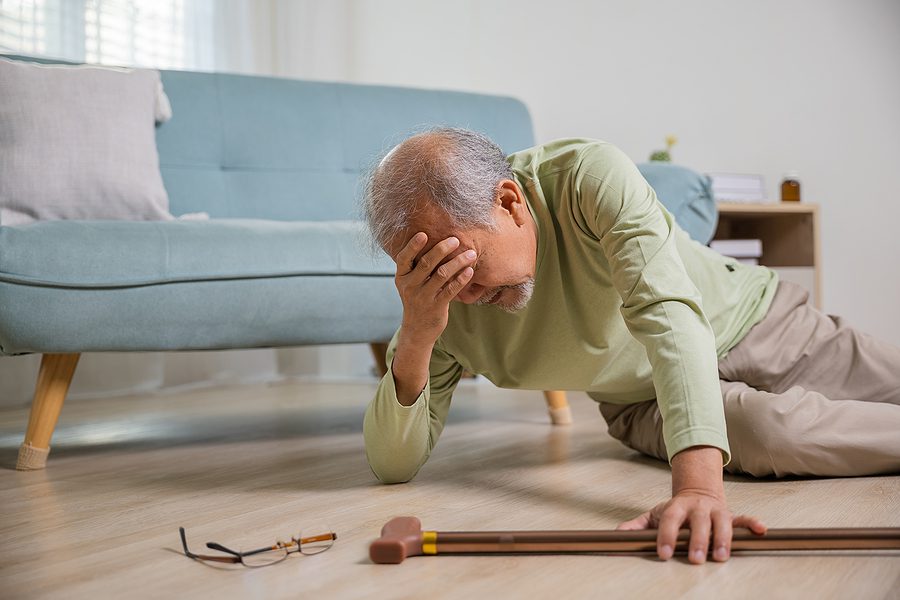A Traumatic Brain Injury (TBI) can seriously affect a person’s ability to care for themselves and stay safe. In seniors, this risk can be much greater. March is Brain Injury Awareness month, so we want to provide some much-needed information regarding how a TBI might affect your elderly loved one. Overall, Traumatic Brain Injuries can lead to disability or even death. Below, we will discuss the risks of TBI, and how to help your loved one after they experience one. We will also include ways to reduce your loved one’s risks of experiencing a TBI.
TBI Statistics
According to the CDC, Seniors over the age of 75 have the highest risk of experiencing a TBI. This age group makes up roughly 32% of all hospitalizations from Traumatic Brain Injuries. Additionally, they account for 28% of all TBI-related deaths in the US. According to a 2008 study, falls are the leading cause of TBI for older adults, making up 51% of the pool. To highlight how much this impact is, the second leading cause was auto-accidents, at 9%.
Understanding the Effects of a TBI
When an individual experiences a traumatic brain injury, there are a number of effects that may follow. Generally, different parts of the brain control different aspects of bodily function. Some symptoms will fade over time, while others may become chronic. Depending on where the impact occurred, your loved one might experience different symptoms. However, there are a variety of more common symptoms, which we will list below. Physical symptoms include:
- Headaches
- Nausea
- Dizziness and balance issues
- Fatigue
- Ringing in the ears (tinnitus)
- Seizures or convulsions, or the development of epilepsy
- Light or noise sensitivity
- Muscle weakness
- Blurred vision
- Poor sleep patterns
Additionally, there are cognitive symptoms that one might experience after a TBI. These may include:
- Impaired memory
- Mood swings or personality changes
- Poor focus or attention span
- Difficulty with critical thinking
- Depression and/or Anxiety
- Poor impulse control
Providing Care After A TBI
After your loved one experiences a TBI, they will likely require more care. This is especially true if they were hospitalized after their injury. Both cognitive and physical symptoms can lead to disability in individuals after a TBI. For seniors, the risk of disability after brain injury is much greater. Even if your loved one was very independent before, a TBI can make it very difficult for them to provide sufficient care for themselves. Even everyday tasks, such as grooming or preparing food, can become difficult after a brain injury. As such, you may want to consider hiring a care professional to assist them with their daily needs.
Falls and Traumatic Brain Injuries
As mentioned above, TBIs in seniors are often caused by falls. Once an individual experiences a traumatic fall, the likelihood that another will occur is very high. This is especially true if they experience a TBI with the first fall. Because brain injuries often lead to balance issues and muscle weakness, falls may become more commonplace. This can greatly affect your loved one’s mortality risk.
Reducing Fall Risks for Seniors
Limiting your loved one’s risk of falling can greatly help. Overall, the best way to do this is to reduce tripping hazards and provide assistance where it may be needed most. Area rugs and untucked wires are often easy enough hazards to remove. Reducing clutter in the home is also important. Be sure to install grab bars in the bathroom, to help your loved one in the shower or by the toilet. Additionally, anti-slip mats and shower chairs can further reduce bathroom falls. Lastly, reduce the need for your loved one to move floors as much as possible throughout the day. If necessary, install a chair lift to help them navigate floors more easily.
In the Event of a Fall
If your loved one has suffered from a fall, it will likely happen again. While you can work to reduce fall hazards, they may still experience another. Preparing your loved one in the event of a fall can help reduce the likelihood of a fatal fall. Emergency assistance buttons can be vital in fall recovery. Instruct your loved one to keep their cell phone or wireless home phone on them at all times. In-home senior care can also be helpful in providing assistance should they fall.
Safe Harbor Healthcare Services does not provide medical, healthcare, or financial advice via articles. This material has been prepared for informational purposes only. It is not intended to provide, and should not be relied on for medical advice.
Safe Harbor Healthcare Services has been providing excellent home care on Staten Island since 1967. Our services help the elderly and disabled live safely and independently; while giving their families the peace of mind they need. For more information contact us by clicking here, or by calling (718)-979-6900.

